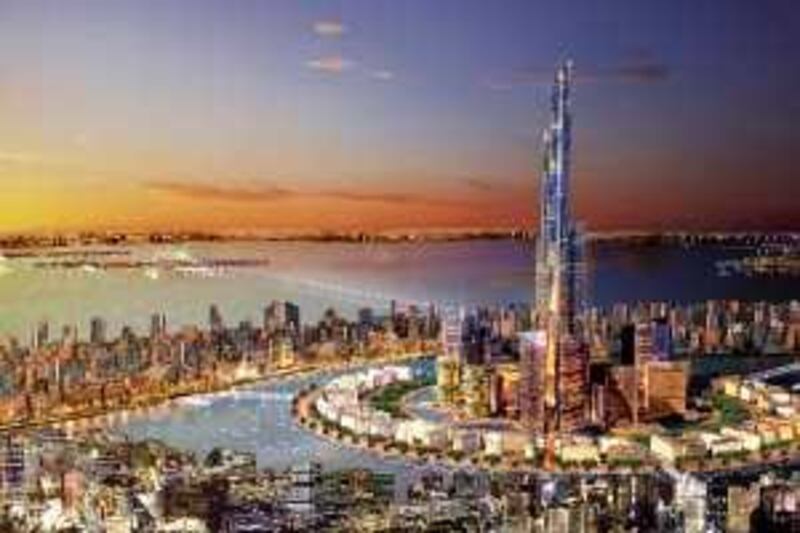KUWAIT CITY // More than 150 top government officials met with the prime minister last week to discuss Kuwait's annual and five-year plans, which will attempt to kickstart the country's development after years of short-sighted planning and political infighting. The prime minster, Sheikh Nasser Mohammed al Ahmed al Sabah, told assembled officials that the meeting was "to call on each of you to bear your responsibilities" towards implementing the development plan, worth 30 billion dinars (Dh382bn), that was approved by parliament in February. The five-year plan is the government's first attempt at a multiyear strategy since 1986.
The deputy prime minister for economic affairs, Sheikh Ahmed al Fahad al Sabah, said 798 construction projects worth 4.8bn dinars were planned for the forthcoming fiscal year, twice the budget of projects for the previous year. He said the five-year plan was based on 330 policies that would be supported by 45 new laws, and that five public sectors - housing, electricity, ports, warehouses and health insurance - would be privatised.
In his speech, the prime minister called for greater co-operation between the government and parliament. The fractious relationship between the two has caused several breakdowns in the assembly, hampering the making of laws. Sheikh Nasser's decision to face the MPs last December in a closed-door interpellation helped ease the tension, but six ministers have been put on the podium since last's May's election, diverting parliament's attention from the economy.
Jeremy Cripps, the head of the business and economics division at the American University of Kuwait, said the ministers' new-found willingness to face MPs with "a determination to delay things" has allowed them to show that they are "completely on top of the situation". The new plan will attempt to boost Kuwait's lagging infrastructure by pumping billions into megaprojects such as the $77bn City of Silk, a bridge that will connect the new city to Kuwait City and a port on Boubyan Island. The oil sector will also benefit from projects such as a new $14.5bn oil refinery that was previously held up in parliament. "We're talking about major infrastructure developments and in the process the provision of infrastructure for foreign investment," Mr Cripps said. "It's not going to happen overnight; we're probably talking about the rest of 2010 implementing it, getting the documents signed. 2011 will probably be a big boom in Kuwait - I mean huge."
If the new laws make life easier for companies, they might reverse the country's reputation as an increasingly difficult destination to do business. The World Bank's Ease of Doing Business Index 2010 ranks Kuwait 61 out of 183 countries, nine places lower than the previous year. Saudi Arabia is the Gulf Co-operation Council's best-placed performer, at 13, and only Oman is ranked worse than Kuwait within the bloc, at 65.
But now Kuwait is trying to plan for the long-term. The five-year plan is part of the government's "Vision Kuwait 2035", which was launched before the prime minister's meeting last week. The report proposes reforms to the oil, trade and finance sectors, business environment, and health and education systems. Sheikh Ahmed said the vision was inspired by the emir's wish to make Kuwait a major financial hub, a goal that Mr Cripps said he believed was within the country's reach.
"The potential here is very high for a finance centre. Bahrain has the law and the legislation, but they don't have the money. Kuwait has an enormous amount of ownership over everywhere else in the Gulf, so it's got an enormous amount of capital, and what you need to establish a major financial centre is capital. It may be temporarily outside, but it's all going to come back," he said. Tony Blair, the former British prime minister who has been called in to work on the project, told the state news agency, Kuna, at the launch that Kuwait's "history is great with a proud tradition of entrepreneurship and trading. But the plain truth is that without a change in its direction, this potential will not be realised."
Kuwait could be a "regional powerhouse", Mr Blair said, but if there is no reform, then the future of this "great country will be uncertain". He said since the last parliamentary elections there has been "renewed vigour" in Kuwaiti politics. Some local commentators greeted Mr Blair's launch of the new vision with scepticism. "We all laughed when Mr Blair was announcing his vision," wrote the Kuwait Times's Badrya Darwish in a front-page editorial after the launch of the project was announced.
jcalderwood@thenational.ae





